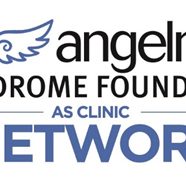
Angelman Syndrome Clinic Opens at Massachusetts General Hospital
Second Angelman Syndrome Clinic Opens at Massachusetts General Hospital
Comprehensive Support for Individuals with Angelman syndrome from Infancy through Adulthood
BOSTON, October 23, 2012 – Massachusetts General Hospital (MGH), MassGeneral Hospital for Children and the Angelman Syndrome Foundation (ASF) announced today the opening of the Angelman Syndrome Clinic, one of only two in the country. The facility—made possible through a partnership between MGH and MassGeneral Hospital for Children and the ASF—is focused on serving the comprehensive medical needs of individuals with Angelman syndrome. With the creation of the clinic, individuals with Angelman syndrome and their families can access multiple subspecialists and a variety of medical resources in one setting, as opposed to visiting multiple locations across the nation. The Angelman Syndrome Clinic is unique as it can leverage the variety of expertise and specialized care available at MGH to help individuals with Angelman syndrome from infancy through adulthood.
“Individuals with Angelman syndrome have extreme challenges obtaining the care they need as they grow into adults. MGH is uniquely positioned to provide services to this portion of the population and their families,” said Dr. Ron Thibert, DO, MsPH, and co-director of the Angelman Syndrome Clinic at MassGeneral. “Our partnership with the ASF has allowed us to further meet these needs and provide the comprehensive medical services that improve patient and families’ quality of life.”
Occurring in one in 15,000 live births, Angelman syndrome is a congenital disorder often associated with autism that causes severe neurological impairment that appears in newborns and lasts for a lifetime. During fetal development, the loss of function of a particular gene in the brain occurs, resulting in neurons functioning improperly and causing deficits in development. Individuals with Angelman syndrome experience developmental delay, lack of speech, seizures, walking and balance disorders, and typically exhibit a happy demeanor characterized by frequent smiling, laughter and excitability.
The purpose of the Angelman Syndrome Clinic is to reduce the frequency and severity of Angelman syndrome symptoms, particularly seizures, and to develop dietary regimens for individuals that further assist in the reduction of symptoms. Furthermore, the clinic has the unique ability to enhance education and learning for individuals with Angelman syndrome, thus helping them achieve their full developmental potential. With the ultimate goal of improving quality of life for individuals with Angelman syndrome, the clinic provides “one-stop-shop” access to a clinical geneticist, neurologist, psychiatrist, psychologist, speech language pathologist, physical/occupational therapist, genetic counselor, social worker, and nutritionist all specializing in Angelman syndrome.
“Partnerships, such as the one we are announcing with MGH, enable the Angelman Syndrome Foundation to provide direct support and access to resources that individuals with Angelman syndrome and their families need,” said Tim McCarty, president of the ASF’s board of directors. “The MGH staff care deeply about helping improve quality of life for individuals with Angelman syndrome and it is through research spearheaded by MGH that several advancements have been made in helping enhance quality of life for those with Angelman syndrome and their families.”
Earlier this year, Dr. Thibert announced that a low-glycemic index treatment (LGIT) for individuals with Angelman syndrome has proven successful in significantly reducing seizures by up to 90 percent in most individuals on the diet. Often a life-threatening symptom, this dietary treatment is relatively easy to implement and interferes little, if at all, with other treatments prescribed for other symptoms. The LGIT study was funded in part by the ASF.
The Angelman Syndrome Clinic is located at MGH’s main campus at 55 Fruit St., Boston, Mass. 02114. Elias Shaaya is the clinic coordinator and can be reached by contacting patient services coordinator Veronica Robinson at 617-726-6540.
For more information about MGH, please visit www.massgeneral.org.
ABOUT MASSACHUSETTS GENERAL HOSPITAL
Massachusetts General Hospital, founded in 1811, is the original and largest teaching hospital of Harvard Medical School. The MGH conducts the largest hospital-based research program in the United States, with an annual research budget of more than $750 million and major research centers in AIDS, cardiovascular research, cancer, computational and integrative biology, cutaneous biology, human genetics, medical imaging, neurodegenerative disorders, regenerative medicine, reproductive biology, systems biology, transplantation biology and photomedicine. In July 2012, MGH moved into the number one spot on the 2012-13 U.S. News & World Report list of “America’s Best Hospitals.”
